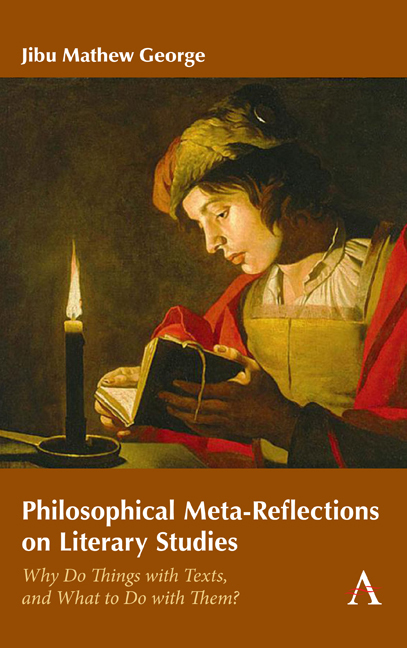 Philosophical Meta-Reflections on Literary Studies
Philosophical Meta-Reflections on Literary Studies Book contents
- Frontmatter
- Dedication
- Content
- Acknowledgements
- Introduction
- 1 The Why and Wherefore of Academic Disciplines: The Humanities and the Human World Process
- 2 If Literature were to Disappear from the Spectrum of Disciplines …
- 3 Beyond for and Against: Tendencies of Contemporary Criticism
- 4 The Aesthetic and the Political
- References
- Index
2 - If Literature were to Disappear from the Spectrum of Disciplines …
Published online by Cambridge University Press: 11 December 2019
- Frontmatter
- Dedication
- Content
- Acknowledgements
- Introduction
- 1 The Why and Wherefore of Academic Disciplines: The Humanities and the Human World Process
- 2 If Literature were to Disappear from the Spectrum of Disciplines …
- 3 Beyond for and Against: Tendencies of Contemporary Criticism
- 4 The Aesthetic and the Political
- References
- Index
Summary
Why Do Things with Texts?
As students, some of us, at least during a brief phase of our education, have been part of a peer culture which cultivates belief in a disjunction between what happens inside the classroom and the life outside, except, of course, as one of the stepping stones to a career (Learning is earning!). This belief is the subversive subtext of all classroom interactions except of those which guarantee immediate ‘entertainment’. But the professional practitioner of a discipline does not have this luxury. If she/ he is asked why it should be studied at all, it does not suffice to amend Seneca, who criticized armchair philosophers, and platitudinize: Non scholae sed vitae discimus (we do not study for the school, but for life). A teacher of the assortment of traditional and contemporary texts which we continue to call literature, who is conscious of the nature of the discipline, will not be able to imagine teaching it without finding at least tentative answers to the question ‘Why is it studied/ taught?’. When a student of literature remarks that a classroom discussion ‘goes over my head’, except in cases of the ideological objection, it is not only a matter of incomprehension but also of contestable relevance. More often than not, the ‘So what?’ which seeks a rationale is often an undiscerned supplement to the ‘What?’ of incomprehension. If literary studies were to disappear from the spectrum of academic disciplines, would we really miss something? Or, would we continue to do the myriad of things we do now, even in the absence of a label? Can disciplines exist without reflecting on why they exist and how they are organized? Even if the answer is in the affirmative, literature is certainly not one among those disciplines. Literary studies are a discipline which has a rich precedent of critical self-consciousness. There is no clearer indicator of this self-consciousness than the sophisticated and effervescent debate which problematizes its very subject matter – notions of what qualifies as ‘literature’.
In any discipline, an adequate understanding of the object of study and a reflection on what exactly one can do with it determine the nature of study itself. One needs to ask if there are domain-specific canons of reasoning. If there are, must we pay heed to them, especially in the contemporary academic ambience of ‘radical doubt’?
- Type
- Chapter
- Information
- Philosophical Meta-Reflections on Literary StudiesWhy Do Things with Texts, and What to Do with Them?, pp. 29 - 52Publisher: Anthem PressPrint publication year: 2019
